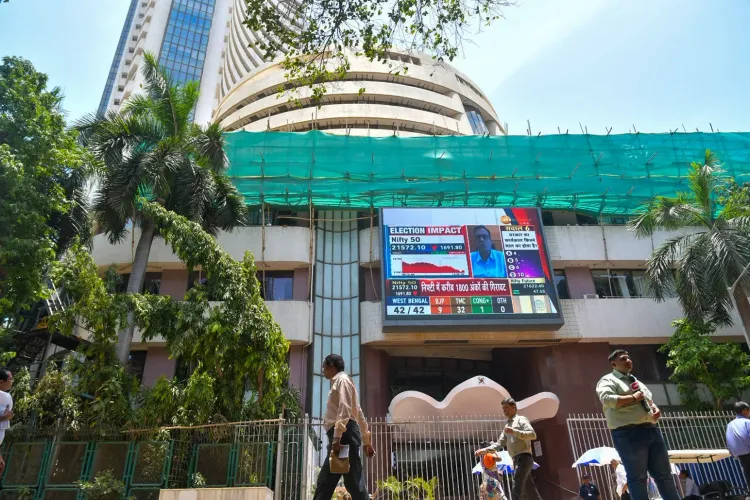Is the Indian Stock Market Thriving Amid Geopolitical Tensions?

Synopsis
Key Takeaways
- Domestic indices showed resilience by turning positive despite geopolitical concerns.
- Strong buying was noted in the auto, IT, and PSU banks sectors.
- Foreign institutional investors were net buyers, indicating confidence in the market.
- The Sensex and Nifty indices are crucial indicators to watch for market trends.
- Analysts suggest monitoring key resistance and support levels for future movements.
Mumbai, June 18 (NationPress) The domestic benchmark indices started the day in the red on Wednesday amid escalating geopolitical tensions, but quickly flipped to positive territory in early trading as buying activity surged in the auto, IT, and PSU bank sectors.
By approximately 9:32 AM, the Sensex was up by 160.49 points or 0.20 percent, reaching 81,743.79, while the Nifty gained 57.40 points or 0.23 percent, climbing to 24,910.80.
The Nifty Bank index increased by 33 points or 0.06 percent, settling at 55,747.15. The Nifty Midcap 100 index stood at 58,358.95 after a slight drop of 20.35 points or 0.03 percent. Meanwhile, the Nifty Smallcap 100 index was at 18,412.80, down 7.55 points or 0.04 percent.
Market analysts suggest that optimism for a peaceful resolution to the conflict in the Middle East has waned, particularly after US President Donald Trump called for an ‘Unconditional Surrender’ from Iran. Recent statements from Trump and US military movements in West Asia indicate a potential escalation of the situation, according to market experts.
However, global equity markets remain calm, as it appears investors believe this conflict can be resolved swiftly without significant effects on the global economy, commented Dr. VK Vijayakumar, Chief Investment Strategist at Geojit Investments Limited.
Within the Sensex, the top losers included Power Grid, Kotak Mahindra Bank, Infosys, HDFC Bank, Axis Bank, NTPC, and M&M. Conversely, Indusind Bank, HCL Tech, Sun Pharma, Eternal, and TCS emerged as the top gainers.
Nifty faced resistance around the 61.8 percent retracement level of its recent decline, experiencing a slight correction thereafter. The immediate resistance level is set around the previous day's high of 24,982, while the critical support zone lies between 24,550 and 24,450, noted Vikram Kasat, Head-Advisory at PL Capital.
On the institutional front, foreign institutional investors (FIIs) were net buyers, acquiring equities worth Rs 1,616.19 crore on June 17, while domestic institutional investors (DIIs) bought equities worth Rs 7,796.57 crore.
In Asian markets, Bangkok, Japan, and Seoul were trading positively, while Jakarta, Hong Kong, and China displayed negative trends.
During the last trading session, the Dow Jones in the US finished at 42,215.80, down 299.29 points, or 0.70 percent. The S&P 500 closed lower by 50.39 points, or 0.84 percent, at 5,982.72, while the Nasdaq dropped to 19,521.09, down 180.12 points, or 0.91 percent.










